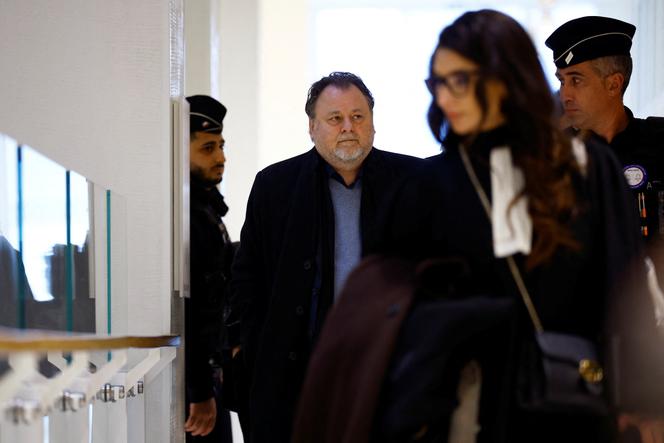A French filmmaker accused of sexually assaulting actor Adèle Haenel when she was 12 went on trial in Paris on Monday, December 9, five years after her allegations fired France’s #MeToo movement.
Christophe Ruggia is accused of sexually assaulting Haenel – star of films including Portrait of the girl on fire (Portrait of a Lady on Fire) and 120 Beats per minute (120 Beats Per Minute) – in the early 2000s when she was between 12 and 14 and he was in his 30s. The Ruggia case is one of a string that has raised questions about sexual violence in French society, particularly in the arts world.
“There had to be a French #MeToo and it landed on me,” former directors’ union chief Ruggia, 59, told the court, calling the allegations “pure lies.” Facing up to 10 years in prison and a fine of 150,000 euros ($159,000) if found guilty of assaulting a minor, he has denied all charges.
“He said that he had created her,” that he “loved her, that others couldn’t understand, that he’d been unlucky to fall in love with her, that she was an adult in a child’s body,” the judge read, referring to Ruggia.

‘Not normal’
Haenel, 35, has become an iconic figure in France for speaking out against “complacency” toward sexual abuse in the film industry. In 2019, she went public with a description of the sexual assault she allegedly suffered at the hands of Ruggia, accusing the director of subjecting her to “constant sexual harassment” from the age of 12 to 14, including “forced kisses on the neck” and touching.
“We’re talking about a famous actor jeopardizing her career” by making these accusations, said Yann Le Bras, Haenel’s lawyer. The “reality,” Le Bras said, is of “a 36-year-old man who molested a 12-year-old girl for several years.”
Ruggia directed Haenel in the 2002 movie The Devils (The Devils), a tale of an incestuous relationship between a boy and his autistic sister, her first film role when she was 12. The film contains sex scenes between the children and close-ups of Haenel’s naked body. Excerpts were due to be shown at the trial.
The actor told investigators about scenes that made her feel “very uncomfortable” and others that were “violent.” Several members of the crew told investigators of their “unease” with Ruggia’s behavior toward the young actor on set, calling it “invasive” and “inappropriate.” “It’s not right, they look like a couple, it’s not normal,” said one of the director’s assistants, speaking about Ruggia’s behavior with 12-year-old Haenel.
“I realized that the film was painful for Adèle, that she was shocked by the shooting,” Ruggia told the court. He also said he had the “same relationship” with a child actor playing the brother.
Between 2001 and 2004, the teenager went to see the man who told her he had “created” her nearly every Saturday. She accused him of finding a pretext to get close to her during the encounters at his home. She alleged that he caressed her thighs, then touched her genitals and breasts. “He would breathe hard” and “kiss me on the neck,” she said.
It was Haenel herself who “asked to come” to his home, Ruggia claimed in the dock, wearing jeans and a grey jacket. He said the two “talked about cinema, chatted, most of the time we spent an hour or an hour and a half in front of the shelves of DVDs.” Ruggia added that Haenel “has reconstructed things, she may have reinterpreted” the interactions as sexual.
Asked by the judge why the actor might now bear a grudge against him, the director suggested that she had become “radicalized.” “Look at what she’s been doing for the past five years. It started with me, then it’s the César (awards) with Polanski” – all the way to saying that “every minister in the government is a rapist,” a visibly aggrieved Ruggia said.
Potentially aggravating circumstances were the considerable age difference between Ruggia and Haenel, and the “psychological control” the director progressively exercised over the young actor thanks to his position of authority. Ruggia has suggested the actor’s accusations stem from wanting “revenge” for not casting her in other projects.
In 2020, Haenel made a noisy exit at the industry’s Césars award ceremony in protest against a prize for veteran director Roman Polanski, who is wanted by the US over statutory rape allegations. “To recognize Polanski is to spit in the face of all the victims,” Haenel said. The actor, who has won France’s highest César film award twice, said she was leaving the industry last year over what she said was its complacency towards sexual predators. The case is one of several rocking France’s film and arts world.
Haenel was set to testify later.
Before the start of the trial, around 50 people, the vast majority of them women, gathered outside the court, chanting: “Adèle, we believe you. Rapists we see you.” Some of the placards read “Thank you, Adèle” and “Adèle, you’re not alone.”

Director accused of abusing French actress Adèle Haenel goes on trial

